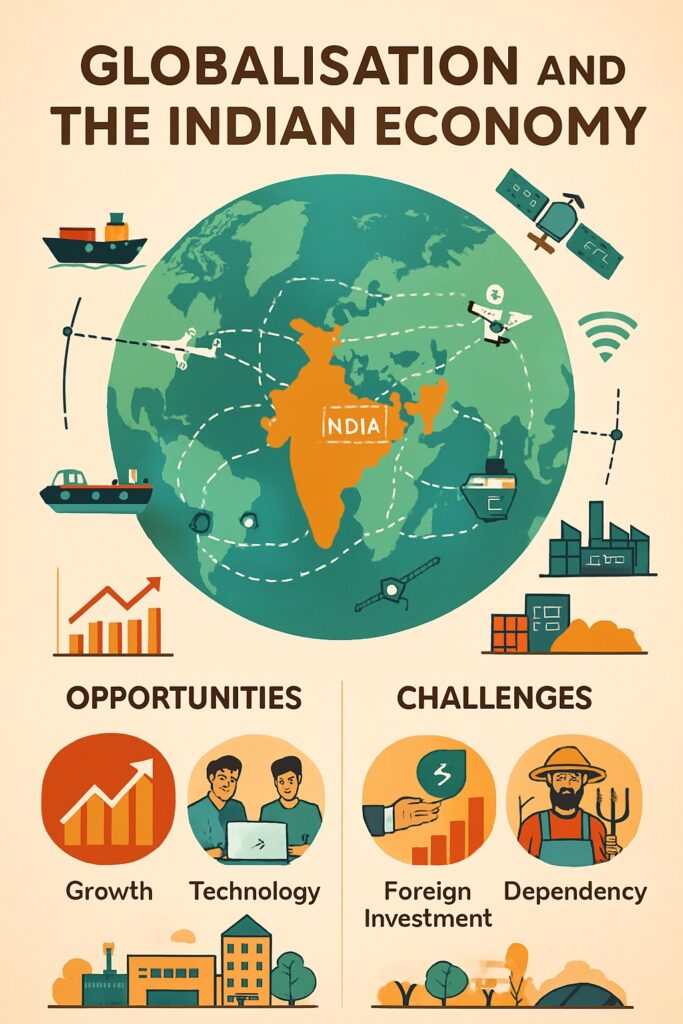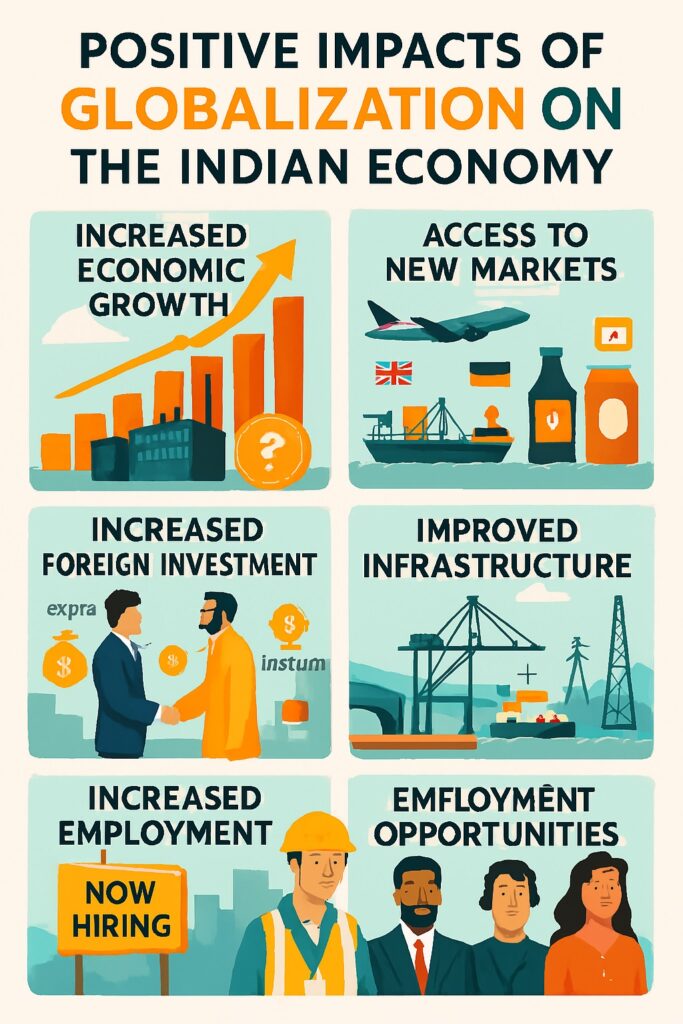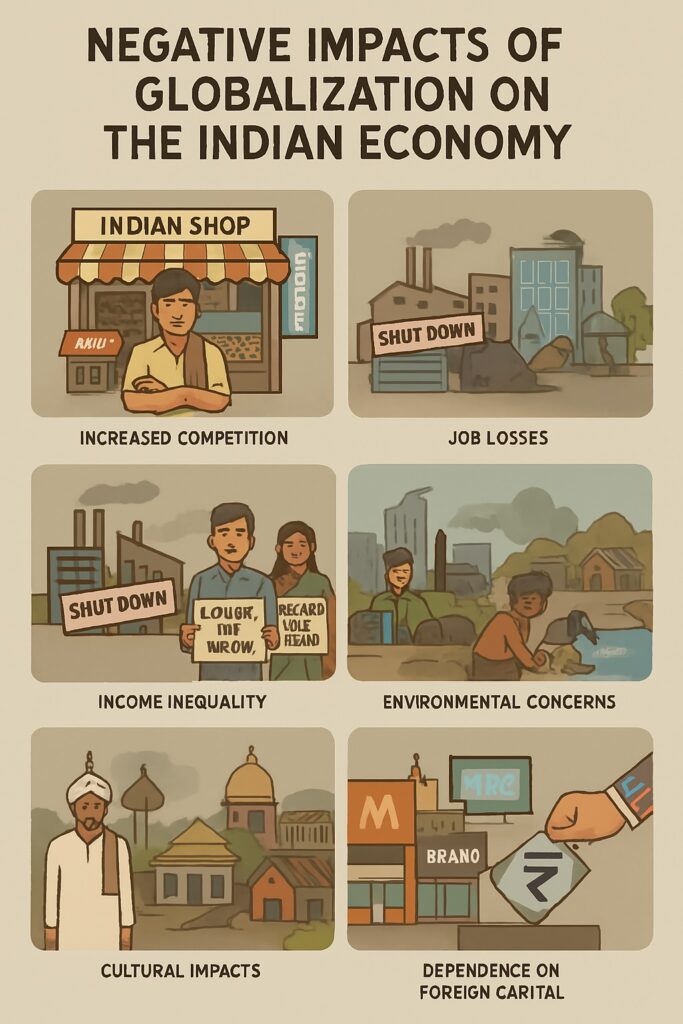The Globalisation and Indian Economy share a relationship of cause and effect. Globalisation refers to the increasing interconnections among countries and interdependence of countries, businesses, and people around the world. It is facilitated by advancements in transportation, communication, and technology. The process of globalization has had a significant impact on the Indian economy, leading to both opportunities and challenges.

Table of Contents
Opportunities of Globalisation and Indian Economy
Increased trade: Globalization has increased India’s trade with other countries, providing access to new markets for Indian goods and services.
Foreign investment: The increase in foreign investment has led to the growth of new industries, such as the software and IT sectors, and created new jobs.
Transfer of technology: Globalization has facilitated the transfer of technology and knowledge, leading to improvements in the efficiency and competitiveness of Indian businesses.
Challenges in Globalisation and Indian Economy
Competition from foreign goods: Globalization has led to increased competition from cheaper foreign goods, hurting the competitiveness of Indian industries.
Job losses: The increased competition from foreign goods and businesses has led to job losses in some sectors of the Indian economy.
Income inequality: The benefits of globalization have not been evenly distributed, leading to increased income inequality and poverty.
Environmental impact: The increased economic activity associated with globalization has also led to environmental degradation and the depletion of natural resources.
Positive Impacts
- Increased Economic Growth: One of the biggest benefits of globalization for the Indian economy has been increased economic growth. The liberalization of trade and investment policies has encouraged foreign investment and increased the flow of goods and services between India and the rest of the world. This has led to increased economic activity and job creation, which has in turn driven economic growth.
- Access to New Markets: Globalization has also provided Indian businesses with access to new markets, both domestically and internationally. The elimination of trade barriers has made it easier for Indian firms to sell their goods and services in foreign markets, which has increased their competitiveness and profitability.
- Increased Foreign Investment: The liberalization of investment policies has encouraged foreign investment in the Indian economy. This has provided Indian firms with access to capital, technology, and expertise, which has helped to drive economic growth and job creation.
- Improved Infrastructure: The increased economic activity and foreign investment that has come with globalization have also led to improvements in the country’s infrastructure, including transportation, communication, and energy systems. This has made it easier for businesses to operate and has improved the overall business environment in India.
- Increased Employment Opportunities: One of the most important benefits of globalization for the Indian economy has been the creation of new job opportunities. As the economy has grown, so too has the demand for labor. This has led to increased employment, especially in industries such as manufacturing and services, which have been major beneficiaries of the globalization process.

Negative Impacts
- Increased Competition: One of the biggest challenges posed by globalization for the Indian economy has been increased competition. The elimination of trade barriers has made it easier for foreign firms to enter the Indian market, which has put pressure on domestic firms to compete on price, quality, and efficiency.
- Job Losses: While globalization has created new job opportunities, it has also led to job losses in certain sectors of the economy. For example, increased competition from abroad has led to the closure of many small and medium-sized businesses in India, which has had a negative impact on employment.
- Income Inequality: Globalization has also contributed to growing income inequality in India. While some sectors of the economy have benefited greatly from the process, others have been left behind. This has led to a growing gap between the rich and poor in India, which has raised concerns about the sustainability of the country’s economic growth.
- Environmental Concerns: Globalization has also had negative impacts on the environment in India. As the economy has grown, so too has the demand for natural resources and energy. This has led to increased deforestation, air and water pollution, and other environmental degradation, which has raised concerns about the long-term sustainability of the country’s economic growth.
- Cultural Impacts: Another challenge posed by globalization for the Indian economy has been cultural impacts. The influx of foreign goods, services, and ideas has challenged traditional cultural values and norms, which has led to debates about the role of cultural identity in a rapidly globalizing world.
- Dependence on Foreign Capital: Another concern about the impact of globalization on the Indian economy is the increasing dependence on foreign capital. As foreign investment has increased, so too has the country’s dependence on the decisions and priorities of foreign investors. This has raised concerns about the long-term stability and independence of the Indian economy.

In conclusion, globalization has had a significant impact on the Indian economy, both positive and negative. To fully realize the benefits of globalization, it is important for India to continue to develop its infrastructure, improve the competitiveness of its industries, and address the challenges posed by globalization, such as income inequality and environmental degradation.
Read: Geography Notes